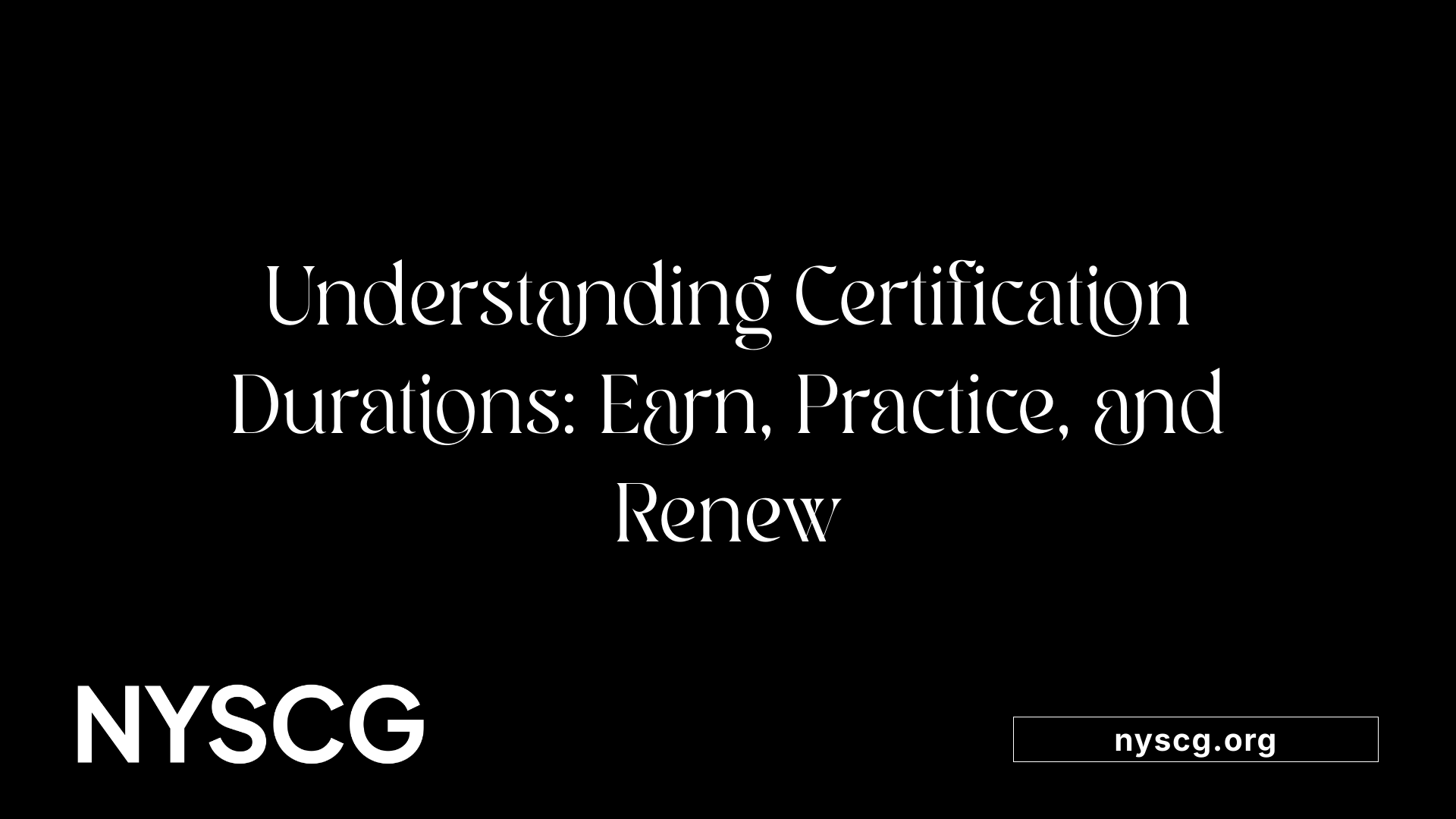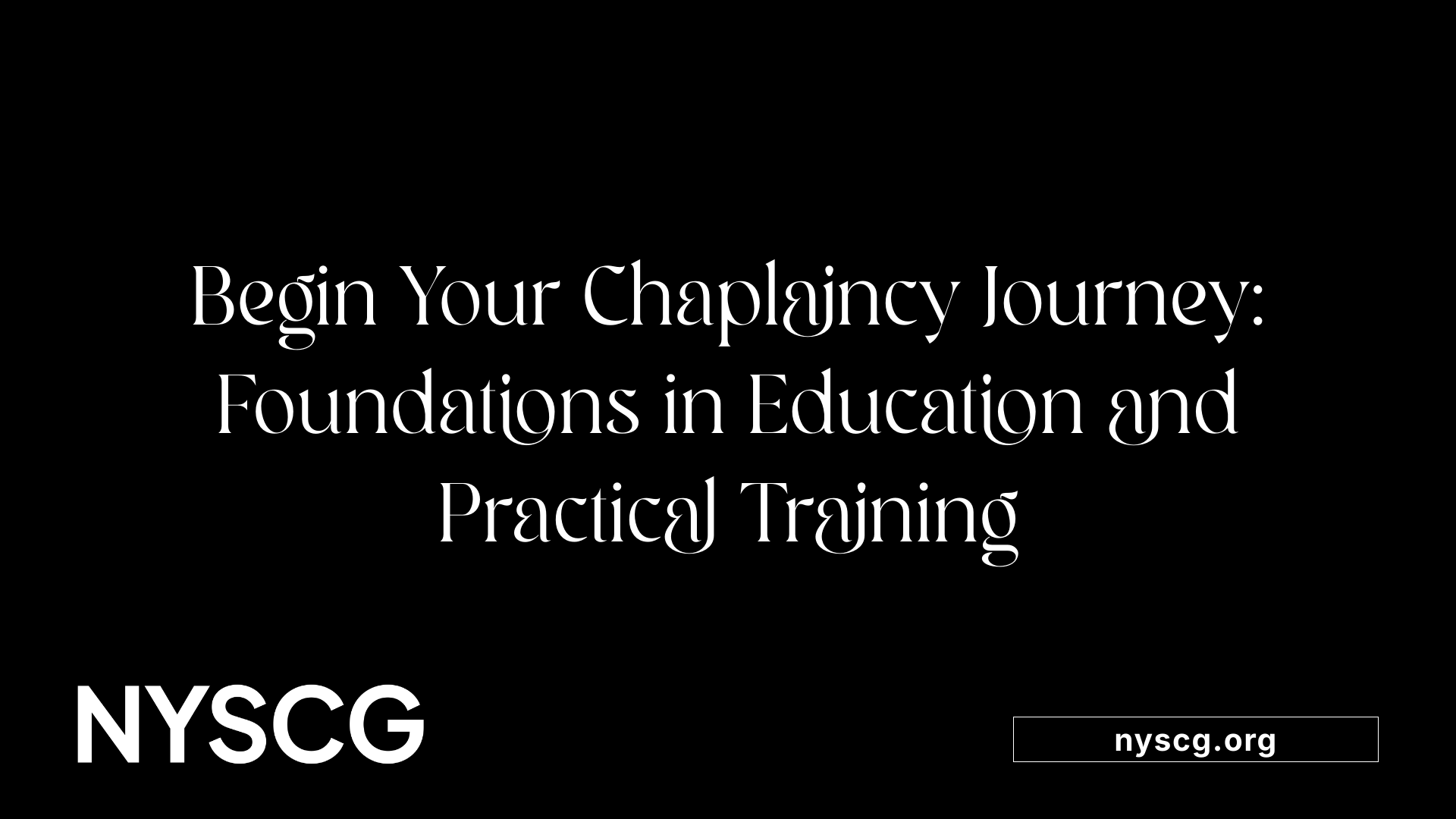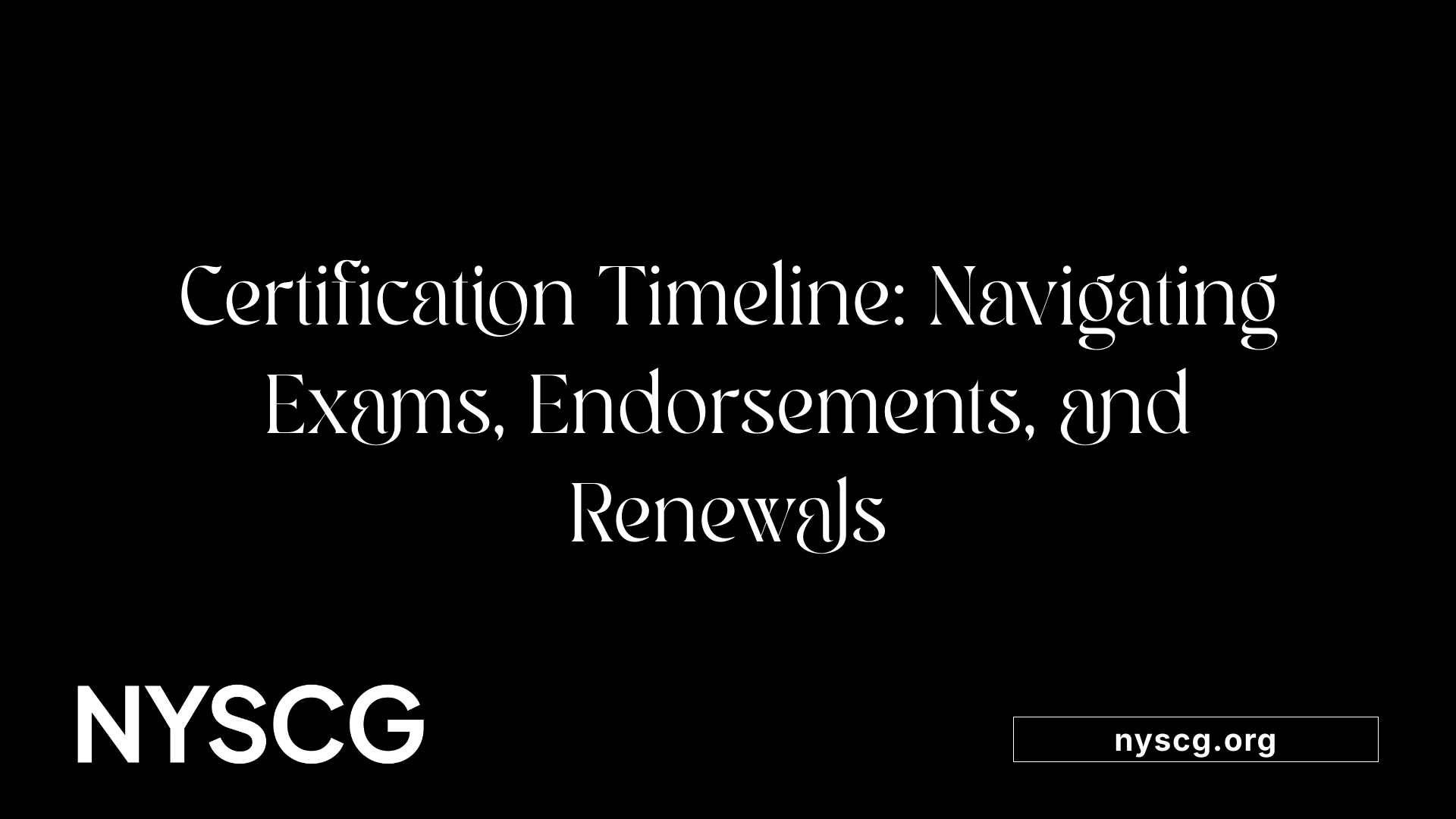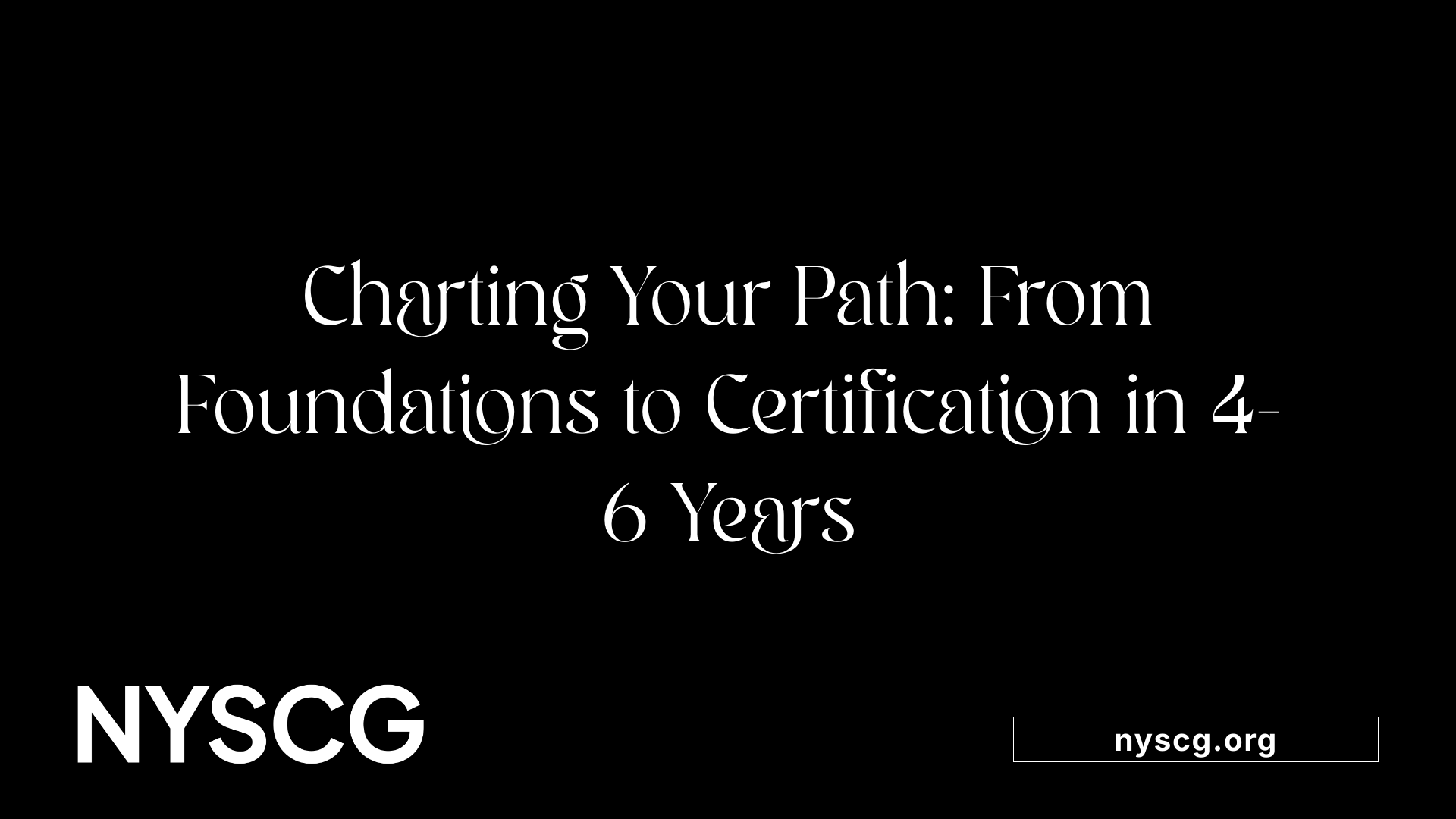How Long Does Chaplain Certification Take to Complete?


Embarking on a career as a chaplain involves a journey through education, specialized training, and certification processes. While the pathway is rewarding, understanding the typical timeframes for each component helps aspiring chaplains plan effectively and set realistic expectations. This article explores how long it generally takes to complete chaplain certification, covering the various programs, training requirements, and certification standards.

The length of certification programs for chaplains varies significantly based on the level of education and training involved. For example, graduate programs like a Master of Arts in Chaplaincy generally take about two years of full-time study. These programs include coursework, field education, and Clinical Pastoral Education (CPE), which is essential for certification.
In contrast, certificate programs designed specifically for chaplaincy accreditation are usually shorter. The Graduate Certificate in Chaplaincy, for example, can be completed in approximately one year, especially when undertaken fully online. Such certificates often do not award academic credits but serve to prepare students for employment or certification within a shorter time span.
| Program Type | Typical Duration | Notes |
|---|---|---|
| Master's Degree (e.g., MA, MDiv) | About 2 years | Includes extensive coursework and supervised practice |
| Certificate Programs | About 1 year | Focused on specific chaplaincy skills and knowledge |
Overall, the time frame for becoming certified as a chaplain can range from about one year for certificate programs up to around two years for comprehensive master's level training. These durations depend on the chosen program's structure, part-time or full-time study options, and additional requirements like CPE.
The specific path to chaplain certification also follows a general timeline, which can span several months. Typically, candidates require about 4 to 8 months to complete all necessary steps, depending on their readiness and scheduling.
In the certification process managed by organizations such as the National Association of Chappellists or similar bodies, candidates must pass a clinical knowledge test and a patient simulation exam.
Candidates often proceed with certification throughout the year, with review periods and assessments scheduled based on individual preparedness. The process involves completing educational requirements, fulfilling supervised ministry hours, and obtaining endorsement from a religious organization.
Once certified, professionals must renew their certification every five years, which may involve continuing education and re-evaluation.
| Certification Step | Typical Duration | Additional Notes |
|---|---|---|
| Preparation & Application | Several months | Varies with individual readiness |
| Certification Process | 4 to 8 months | Includes testing and review |
| Certification Renewal | Every 5 years | Requires ongoing education |
In summary, aspiring chaplains should expect the entire path—from initial education through certification—to take at least several years, commonly around 4 to 7 years, depending on prior education and additional credentials sought. The process is comprehensive, combining academic, practical, and spiritual components to ensure qualified chaplaincy professionals.

Becoming a certified chaplain generally involves a structured pathway of education, practical training, and certification. The journey begins with earning a relevant undergraduate degree, such as in theology, ministry, counseling, or philosophy, which typically takes about four years.
After completing their bachelor's degree, aspiring chaplains often pursue a graduate degree, such as a Master of Divinity (MDiv), Master of Theological Studies (MTS), or an equivalent program, which usually requires an additional two years. Many of these graduate programs emphasize spiritual care, ethics, and pastoral skills necessary for chaplaincy.
Following the academic phase, candidates must undertake Clinical Pastoral Education (CPE). This involves completing at least four units of supervised clinical training, which usually spans approximately 1.5 years when done sequentially.
To achieve certification, individuals must demonstrate competency through application, which includes endorsement or recognition from a faith organization, and fulfillment of work experience hours—often around 2,000 hours of professional ministry practice. Certification processes are managed by recognized bodies like the Association of Professional Chaplains or the Board of Chaplaincy Certification Inc., featuring assessments, interviews, and verification of education and experience. The whole process can take anywhere from one to several years, depending on individual circumstances and chosen certification pathways.
The timeline to qualify as a chaplain typically involves multiple stages. First, obtaining a bachelor's degree generally takes around four years of full-time study. Following this, a master's degree in a relevant field like an MDiv or MTS adds another two years.
Some institutions may offer online or accelerated programs, which can slightly reduce the duration. Nonetheless, the combined period for undergraduate and graduate studies usually totals about six years.
Beyond formal education, completing Clinical Pastoral Education is essential. CPE involves acquiring four units, spanning approximately 1.5 years if completed sequentially. These units are often associated with accredited programs like those offered by ACPE.
In conjunction with education, aspiring chaplains need to accumulate practical experience hours, often about 2,000, and obtain endorsement from their faith community or organization. Taken together, these educational and experiential requirements form a comprehensive pathway, usually extending over about 6 to 7 years from start to certification readiness.
In addition to formal degrees, many chaplains pursue specialized certifications. These may include training in crisis intervention, mental health support, or specific denominational ordination. For healthcare chaplains, completing CPE units is often mandatory, with many centers accredited by the Association for Clinical Pastoral Education (ACPE).
Certification bodies such as the APC or the Spiritual Care Association require candidates to not only complete educational prerequisites but also receive endorsement from a faith community, acquire practical experience, and sometimes pass certification exams.
| Stage | Duration | Main Focus | Additional Details |
|---|---|---|---|
| Undergraduate Degree | 4 years | Foundations in religious studies, theology, counseling | Degree in a relevant field |
| Graduate Degree | 2 years | Advanced theological and pastoral training | MDiv, MTS, or similar |
| Clinical Pastoral Education | 1.5 years | Practical, supervised pastoral care | 4 units, accredited programs |
| Certification and Endorsement | Variable, 1-3 years | Demonstrating competence, gaining professional recognition | Experience + exams |
This pathway ensures that aspiring chaplains are well-prepared to serve in diverse settings, equipped with theological knowledge, practical skills, and official accreditation.

Becoming a certified chaplain involves several educational, training, and experiential steps. First, individuals must complete relevant educational programs, often including a bachelor's degree in fields like religious studies, theology, or ministry. Many pursue a master’s degree, such as a Master of Divinity (MDiv) or Master of Arts in theology, which can take approximately 2 to 4 years.
Following academic achievement, aspiring chaplains usually undertake clinical pastoral education (CPE), involving at least four units that provide practical, supervised ministry experience. This CPE phase often spans about 1.5 years, especially if completed sequentially.
Simultaneously or subsequently, candidates accumulate professional ministry hours—typically around 2,000 hours of supervised practice—to meet certification standards.
Once educational and experiential prerequisites are met, applicants submit a detailed application to a certifying agency like the Association of Professional Chaplains (APC). This application includes documentation of education, CPE units, work experience, and endorsements from religious or faith organizations.
Candidates may need to pass written and clinical exams, and attend interviews or assessments. The entire review and testing process generally takes between 4 to 12 months, depending on preparedness and specific certification paths.
Re-certification is required periodically—usually every five years—requiring ongoing education, ethics review, and possibly additional training or practice hours. This ensures chaplains maintain competence and adhere to professional standards.
Certification validity durations vary by program and certifying organization. For example, the National Association of Catholic Chaplains (NACC) mandates renewal of certification every five years. Renewals typically involve completing continuing education units (CEUs), demonstrating ongoing professional practice, and reaffirming endorsement from a religious community.
The International Faith-Based Office of Chaplaincy (I.F.O.C.) offers a specific Chaplaincy Training Course as a one-time educational experience, completed within 31 days of registration. Since it is a training course rather than a certification, it does not have formal renewal requirements. However, certification issued through I.F.O.C. or similar bodies generally requires periodic renewal, often every five years.
Overall, most formal chaplain certifications involve periodic renewals every five years, emphasizing ongoing professional development and adherence to ethical standards.
Endorsement by a recognized faith community or religious organization is a critical component of chaplain certification. It verifies that the individual’s faith commitments align with their intended chaplaincy role and that they adhere to the doctrinal and ethical standards of their faith tradition.
Experience—both in supervised practice and professional ministry hours—is also vital. It demonstrates practical competency, risk management, and the ability to provide effective spiritual care in diverse settings such as hospitals, military environments, or correctional facilities.
Many certifying agencies require candidates to submit endorsements along with documentation of experience to verify their readiness for official certification. This endorsement process often involves a review of personal faith statements, references, and proof of ongoing religious involvement.
In summary, the certification process involves a comprehensive combination of education, hands-on training, professional experience, and spiritual endorsement. The timeline from start to certification typically ranges from several years, with renewal processes designed to promote continuous professional growth and ethical practice.
The pathway to becoming a professional chaplain involves multiple components, each requiring varying amounts of time and effort. One of the most significant steps is completing Clinical Pastoral Education (CPE), which forms a cornerstone of chaplain training. Typically, CPE involves at least four units, with each unit comprising approximately 400 hours of supervised training. This process generally spans about 1 to 2 years, depending on whether the training is pursued full-time or part-time.
In addition to CPE, candidates must fulfill educational requirements, such as earning a master’s degree in fields like theological studies, ministry, or counseling. The duration for these degrees usually ranges from 2 to 4 years. For instance, a Master of Divinity (MDiv) often takes around three years to complete.
Completing coursework, certification applications, interviews, and background checks can add several months to the timeline. Overall, the entire certification process—from starting education to obtaining credentialing—can take anywhere from 3 months to several years, with most candidates spending approximately 4 to 6 years to fully qualify.
In terms of ongoing commitments, students and recent graduates often dedicate weekly hours to spiritual practices, on-call duties, and community service. Full-time residency programs, common in hospital chaplaincy, typically last about 12 to 15 months and involve 40-hour work weeks, including nights and weekend shifts.
Certification durations and renewal requirements vary across different programs. For example, certifications from the National Association of Catholic Chaplains (NACC) are valid for five years. To maintain their status, chaplains must complete continuing education credits—often about 75 hours—and reapply for renewal.
The I.F.O.C. Chaplaincy Training Course is slightly different; it is a standalone 40-hour training session to be completed within 31 days of registration. Since it is a training course rather than a certification, it does not require renewal. However, it provides foundational knowledge that supports further certifications.
More advanced certifications, including the Advanced Chaplain Certification, typically require periodic renewal every five years. This process involves demonstrating ongoing professional development, accumulating continuing education hours, and sometimes completing additional supervised training.
In summary, most formal chaplain certifications are designed to be valid for periods of five years, with renewal processes that ensure chaplains stay updated on best practices and legal or ethical developments.
| Certification Type | Renewal Period | Common Requirements | Additional Notes |
|---|---|---|---|
| NACC Certification | 5 years | Continuing education, professional practice hours | Must submit renewal application and documentation |
| I.F.O.C. Training Course | N/A | Completion of course during the registration period | One-time course, no renewal required |
| Advanced Certification or similar | 5 years | Continuing education, supervised practice, endorsement from faith community | Usually involves re-application and documentation of ongoing work |

Becoming a chaplain involves a structured pathway that includes education, specialized training, and certification. The total process generally spans around 4 to 6 years.
Educational Foundations: Most aspiring chaplains begin with earning at least a bachelor's degree in fields such as religious studies, theology, ministry, counseling, or philosophy. This stage typically takes about four years. Following this, many pursue a master’s degree like an M.Div, MTS, or a related advanced degree, which adds approximately two years to the timeline.
Specialized and Practical Training: In addition to academic credentials, candidates usually complete Clinical Pastoral Education (CPE). Usually, four units of CPE are required, which can take 1.5 to 2 years when completed sequentially. CPE centers sponsored by organizations like AdventHealth or other accredited programs are recognized by the American Council on Education (ACE) and the ACPE.
Additional Requirements: Prospective chaplains must also accumulate around 2,000 hours of professional ministry practice, often combined with supervised residency programs lasting up to two years. Obtaining endorsement from a religious organization is also essential.
Certification Process: Certification from groups like the Association of Professional Chaplains (APC) involves completing graduate education, CPE units, and accumulating disciplined professional experience. Certification typically involves application review, endorsement, and demonstrating ongoing professional development.
Online and Short Courses: For those exploring chaplaincy careers, shorter programs like the Certificate in Chaplaincy offered by Life Pacific University or Denver Seminary provide foundational knowledge. The online courses, such as the 40-hour I.F.O.C. Chaplaincy Training Course, can be completed within about a month. These facilitate entry-level understanding but must be supplemented with formal degrees and certification for professional practice.
Different components of the pathway can influence how long it takes to become certified. For example,
Calculating all stages, most candidates can expect the full process from starting their undergraduate degree to being fully certified and prepared for service to take about 4 to 6 years.
Those interested should plan for a multi-year commitment involving academic study, hands-on training, and certification procedures. While shorter courses and online modules serve as good initial steps, reaching full certification often involves a combination of several educational and practical components.
| Stage | Typical Duration | Important Details |
|---|---|---|
| Undergraduate Degree | 4 years | In religious studies, theology, or related fields |
| Master’s Degree | 2 years | M.Div, MTS, or equivalent |
| Clinical Pastoral Education | 1.5 - 2 years | 4 units of CPE accredited by ACPE |
| Professional Practice & Endorsement | Up to 2 years | 2,000+ hours of ministry and endorsement |
| Certification & Preparation | Ongoing | Certification exams, continuing education |
Overall, prospective chaplains should prepare for a lengthy but rewarding process, emphasizing structured education, practical experience, and continual professional development.
The journey to becoming a certified chaplain is a structured process that generally spans from around four to six years, depending on individual choices and opportunities. It involves foundational education, specialized training like CPE, clinical experience, and certification procedures. While certificate programs offer faster paths, comprehensive pathways with degrees provide in-depth preparation over multiple years. Aspiring chaplains should factor in their educational timeline, training commitments, and certification renewal cycles when planning their career. By understanding these timelines, candidates can better prepare for the demands and milestones of their chaplaincy journey and confidently step into this meaningful vocation.
All you need is the will to make the world a better place.
New York State chaplain group inc. is a tax deductible organization with a federal tax Id number 92-383-4921